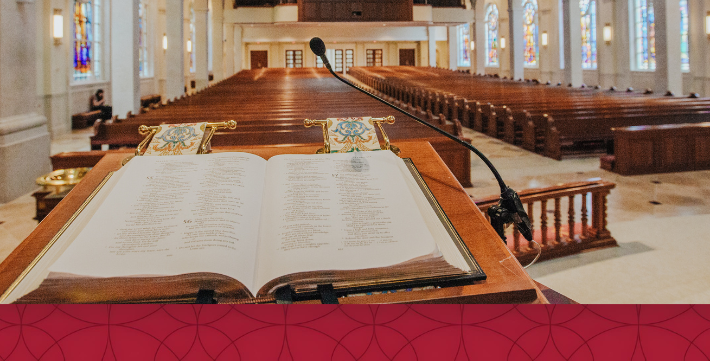Commentary on Joel 2:12-13, 28-29
There is a plaintive quality to today’s lesson. The passage opens with the Lord beseeching the people to return to the Lord; the opening phrase “yet even now” (Joel 2:12) gives the impression that the Lord has made repeated unsuccessful attempts to call the people to repentance, and that this is an “it’s still not too late!” attempt. Even the reminder that the Lord is “gracious and merciful, slow to anger, abounding in steadfast love, and relenting from punishment” (Joel 2:13; compare with Exodus 34:6; see also Jonah 4:2) carries a sense of urgency, if not an edge of desperation.
The second part of the reading has a feeling of dreamy nostalgia, at least to this reader: something on the order of “If we can make it through this”—communicated by the opening phrase “Then afterward …” (verse 28)—“things will be all right again.” Prophecy, dreams, and visions—ways God and God’s will are communicated to humans—will be plentiful and available to all. So much emotion packed into four short verses begs the question: What’s going on in this book?
The prophet Joel’s context is a bit of a mystery. Unlike other prophetic texts that give contextual clues, such as the name of a king of Israel or Judah, or a well-documented political event, Joel only provides his and his father’s names. However, there are important observations we can make by reading through the book in its entirety (recommended—it is quite short!).
First, we can note that the prophet seems to be steeped in Yahwistic traditions, citing traditional texts (such as the Exodus and Jonah references cited above) and using traditional ideas, such as that of the “day of the LORD” (compare with Amos 5:18–24). At various points in the text, the writer hopes for a renewal of ritual associated with temple worship (see, for example, Joel 2:14–17).
Not far into chapter 1, we also discover that the text is quite unsettling. Parts of it are like watching a dystopian movie where some kind of threat swarms over a city and leaves a path of destruction in its wake. Instead of the cyborgs, robots, or zombies that we might expect in a movie, locusts (described using four different terms—cutting, swarming, hopping, and destroying; Joel 1:4) and an invading nation (described as lions’ teeth and fangs; see Joel 1:6) wreak havoc in the land.
The description of the “day of the LORD” (the passage immediately preceding the first part of our pericope; Joel 2:1–12) is particularly disquieting, given the density and intensity of the army God summons for a battle of cosmic proportions. Yet, for God’s people, the devastation of “the day of the LORD” is not the final outcome; the Lord “became jealous for his land, and had pity on his people” (2:18). Renewal for the land, animals, and people is anticipated (2:19–27) before God’s spirit is poured out (2:28–29). Chapter 3 repeats the cycle of judgment (this time against the nations; 3:9–16) followed by the anticipation of a secure future for God’s people, with whom God dwells (3:17–21).
The features we have observed show characteristics of both prophetic and apocalyptic literature. These genres are similar: Both are political and social commentary, in which the writers are reacting to what is going on in their own context and interpreting events—and ways to navigate them—in terms of their relationship with God.
The genre of apocalyptic literature emerged during Seleucid rule in Judea in the first half of the second century BCE, particularly in response to the Seleucid king Antiochus IV’s banning of Jewish cultural practices, as discussed in the commentary for last Sunday’s reading (Daniel 6:6–27). In that particular context, the apocalyptic literature contained within Daniel 7–12 is but one of several literary responses to the question of how one should remain faithful to one’s cultural practices when surrounded by, or potentially compelled to adopt, different ones.
Writers of apocalyptic literature addressed the conundrum using vivid imagery, understanding the occupying forces (Greeks/Seleucids or, in texts such as Revelation in the New Testament, the Romans) as disrupting the cosmic order as God wants it. Whereas in the stories in the first half of the book of Daniel, Daniel and his colleagues perform a delicate dance, sometimes accommodating “Babylonian” culture and sometimes rejecting it, apocalyptic literature tends to approach the question in starker “us/them” terms.
Using symbolic language, it expresses faith in God’s intervention in the situation in a cosmic kind of way to make things right in the world, especially for those who have stayed faithful to God. Essentially, it anticipates and expresses confidence in God’s reign—not (fill in the blank with a Greek/Roman ruler)’s reign.
The book of Joel does not have all the characteristics we would expect in an apocalypse (a particular narrative that contains a variety of apocalyptic elements), and his specific context is not clear.1 However, recognizing the resonances of apocalyptic thinking in today’s reading, particularly the anticipation of God’s justice on earth and God’s will communicated to all people, provides a compelling image during the season of Advent, when we anticipate God’s intervention in human affairs in the form of the Christ child and are called to live in God’s just reign.
Notes
- A very helpful summary of elements of apocalyptic literature within a discussion of the book of Joel can be found in Christine Hayes, Introduction to the Bible (New Haven: Yale University Press, 2012), 382–86.
PRAYER OF THE DAY
Loving Lord,
When we have strayed, you have called us to come home to you. “Return to me with all your heart, with fasting, with weeping, and with mourning; rend your hearts and not your clothing.” With all our hearts we return to you, and gratefully accept your gentle love, for the sake of the one whose spirit lives in us, Jesus Christ our loving savior. Amen.
HYMNS
Lost in the night ELW 243
O come, all ye faithful ELW 283, H82 83, UMH 234, NCH 135
Spirit of gentleness ELW 396, NCH 286
Spirit of mercy, truth, and love H82 229
Spirit of the living God, fall afresh on me UMH 393, NCH 283
CHORAL
Rejoice, rejoice believers, Adam Gumpeltzhaimer



December 8, 2024